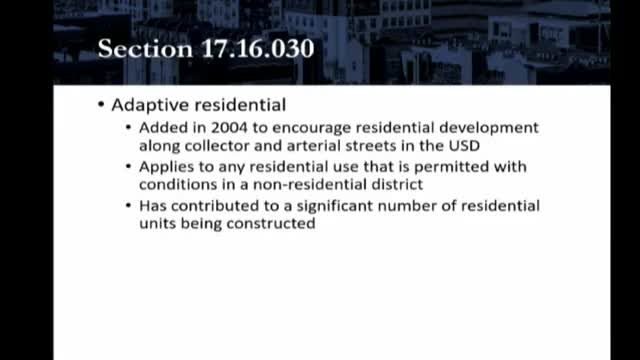Council proposes major zoning changes to boost housing supply
June 28, 2024 | Planning Commission Meetings, Nashville, Davidson County, Tennessee

This article was created by AI summarizing key points discussed. AI makes mistakes, so for full details and context, please refer to the video of the full meeting. Please report any errors so we can fix them. Report an error »

In a recent government meeting, officials discussed proposed amendments to the zoning code, specifically focusing on the \"adaptive residential\" section, which was introduced in 2004 to facilitate residential development along major roadways in the Urban Services District (USD). The amendments aim to expand eligibility for residential development by removing certain restrictions, including the requirement that properties have a majority of their frontage on collector or arterial streets.
Currently, approximately 55,100 parcels across the county are zoned in districts that could be impacted by these changes, with about 78% already eligible for adaptive residential use. The proposed amendments would primarily open up additional parcels outside the USD while still ensuring that new developments remain centered around commercial areas and corridors.
City staff recommended approval of the amendments, highlighting their potential to increase housing availability in response to Nashville's pressing need for 52,000 new homes by 2030. Council member Horton, who is also the applicant for the amendments, expressed enthusiasm for the changes, emphasizing their importance in expediting the housing development process.
Supporters of the amendments, including former council members and community advocates, underscored the necessity of streamlining entitlement processes to foster economic growth and meet housing demands. They argued that reducing bureaucratic hurdles would attract investors and facilitate timely project completions.
However, some community members raised concerns about maintaining a balance between residential development and essential services, such as grocery stores, in rapidly growing areas. They urged officials to consider the implications of increased housing density on local infrastructure and amenities.
The discussion also touched on the importance of community engagement, with assurances that existing notice requirements for developments would remain intact. Officials acknowledged the need to consider the impact of these changes on historically significant neighborhoods and communities that have experienced gentrification.
As the meeting concluded, the council members expressed a commitment to ensuring that the proposed amendments would not only address housing shortages but also support sustainable community development. The recommendations will be further evaluated before a final vote is taken.
Currently, approximately 55,100 parcels across the county are zoned in districts that could be impacted by these changes, with about 78% already eligible for adaptive residential use. The proposed amendments would primarily open up additional parcels outside the USD while still ensuring that new developments remain centered around commercial areas and corridors.
City staff recommended approval of the amendments, highlighting their potential to increase housing availability in response to Nashville's pressing need for 52,000 new homes by 2030. Council member Horton, who is also the applicant for the amendments, expressed enthusiasm for the changes, emphasizing their importance in expediting the housing development process.
Supporters of the amendments, including former council members and community advocates, underscored the necessity of streamlining entitlement processes to foster economic growth and meet housing demands. They argued that reducing bureaucratic hurdles would attract investors and facilitate timely project completions.
However, some community members raised concerns about maintaining a balance between residential development and essential services, such as grocery stores, in rapidly growing areas. They urged officials to consider the implications of increased housing density on local infrastructure and amenities.
The discussion also touched on the importance of community engagement, with assurances that existing notice requirements for developments would remain intact. Officials acknowledged the need to consider the impact of these changes on historically significant neighborhoods and communities that have experienced gentrification.
As the meeting concluded, the council members expressed a commitment to ensuring that the proposed amendments would not only address housing shortages but also support sustainable community development. The recommendations will be further evaluated before a final vote is taken.
View full meeting
This article is based on a recent meeting—watch the full video and explore the complete transcript for deeper insights into the discussion.
View full meeting
